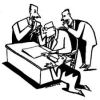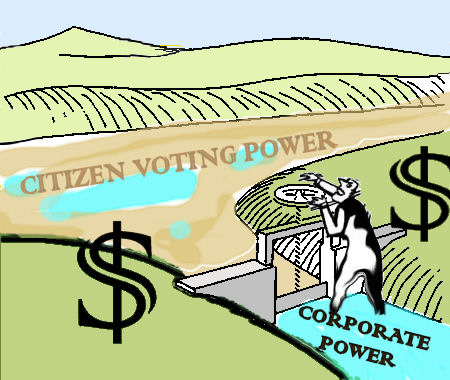Traffic congestion in the Corridors of Power
 It is just possible that the terrorist attack warnings by both the PM and ASIO head, Duncan Lewis, and the announcement of a hefty hike in defence spending was just a coincidence. But for those cynics who claim otherwise, let me point out that at this very moment we already have more than 1000 (perhaps as many as 4000) terrorists running riot in Canberra and doing so with the full knowledge and encouragement of our government.
It is just possible that the terrorist attack warnings by both the PM and ASIO head, Duncan Lewis, and the announcement of a hefty hike in defence spending was just a coincidence. But for those cynics who claim otherwise, let me point out that at this very moment we already have more than 1000 (perhaps as many as 4000) terrorists running riot in Canberra and doing so with the full knowledge and encouragement of our government.
 It is just possible that the terrorist attack warnings by both the PM and ASIO head, Duncan Lewis, and the announcement of a hefty hike in defence spending was just a coincidence. But for those cynics who claim otherwise, let me point out that at this very moment we already have more than 1000 (perhaps as many as 4000) terrorists running riot in Canberra and doing so with the full knowledge and encouragement of our government.
It is just possible that the terrorist attack warnings by both the PM and ASIO head, Duncan Lewis, and the announcement of a hefty hike in defence spending was just a coincidence. But for those cynics who claim otherwise, let me point out that at this very moment we already have more than 1000 (perhaps as many as 4000) terrorists running riot in Canberra and doing so with the full knowledge and encouragement of our government.
These agents of destruction are of course working undercover as lobbyists, but what ever their name tag, they do far more damage than their religiously inspired equivalent. Consider the onslaught on our country made by clients of the Minerals Council, projects that have laid waste to some of our best agricultural land and compromised our water supplies. ISIS would need nuclear weapons to inflict that sort of damage.
Lobbyists are a gifted body of saboteurs that have managed to infiltrate federal and state governments, turning successive environmental ministers into rubber stamps for whatever 'significant' project they want approved. Not content with having these ministers in their pockets, it seems to me that the big guns, Gina Rinehart, Clive Palmer and Andrew Forest were more than just instrumental in squashing both the mining super profit and the carbon tax, the proceeds of which would have gone a long way to fixing the budget. Now it appears they have the CSIRO in their sights, cutting funding into research into those areas which might embarrass fossil fuel advocates.
If the Mineral Council had a couple of environment ministers and ex PM Tony Abbott as unquestioning supporters, then their co-conspirator, the Property Council, have gone one better. It seems their undercover work has so emasculated the government's tax reform debate that the PM was forced to take their line on preserving negative gearing. This group of unelected influence-mongers have managed to usurp the state planning authorities and now have the power to abscond with public land, rail corridors, museums, and to beggar mortgage-stressed home buyers, leaving the nation with 1.6 trillion dollars in private debt.(http://www.dailyreckoning.com.au/why-has-australian-household-debt-tripled-in-the-last-25-years-cw/2015/06/18/) .
During this rampage their clients, the developers and financiers, easily managed to outperform the unions and are right up there with FIFA (Fédération Internationale de Football). Some of the proceeds from a $10b ponzi scam in India have been directed into Gold Coast real estate market after, of course, the complementary political donations , doubtless more details will show who got what.
While discussing councils it would be unfair to dismiss the humble efforts of the Food and Grocery Council (F&GC). They don't have much to do with grocers but have a lot to do with food, particularly soft drinks and fast food, which pay more than the stuff farmers produce and which we call fresh food. The above groups have come under a lot of scrutiny because of their role in our obesity crisis which costs, according to who you believe, $21b/year in medical costs and lot more in the abstract, meaning not dollar-costed concept, of wellbeing . So it seems that the F&GC have been able to ward off the scientific studies done by health and medical experts and convince the government health ministers that, despite this high cost to health, cutting back our intake of fast food and sugery drinks would wreck havoc with the economy. To put their achievement into better perspective, about 70 Australians a week are having amputations as a result of preventable diabetes-related complications, a rate of injury that surpasses casualties in every war we have particapated in since WW2.
However before giving the F&GC an award for best lobbyists, it should be pointed out that the various state and federal health departments are less than enthusiastic to take on multi-national corporations even on health issues. This can be seen by their failure to act on the numerous health reports that have fingered coal as a major health hazard. One report that appeared in the Sydney Morning Herald (The Coal and Health in the Hunter report by the Climate and Health Alliance (.pdf) ) put the health cost, just in the Hunter valley alone, as $600m per year, while the US government puts a social cost of $47 per tonne of CO2 admitted by coal combustion. The Australian report went on to note: "There's a total disassociation of who gets the benefits and who gets the pain,” which just about sums up the current attitude of governments. However if we lump coal into the rest of the fossil fuel industries, gas and oil, we get a better idea of their success at influencing government policy. A report by the Australia Institute (Why do we subsidise industry? | The Australia Institute) puts the cost of subsidies given to the fossil fuel industry at $10b per year, which compares favourably with the $1.5b the car industry received over a four year period. As part of our shrinking manufacturing industry this was one that, not only added to innovation, but employed about 1 million people. Perhaps the manufacturing organisation should change its lobbyists.
There of course many other lobbyists with a range of interests and influence including clubs, hospitals, private health funds, sporting organisations, private schools, business and hotels, that have all successfully challenged government policy and the public interest, notably in liquor and gambling, but also in other less noticeable ways, like drugs that are added to the PBS. And they do so in different ways. The Australian Centre for Independent Journalism found, in a survey of major metropolitan newspapers published in Australia in 2010, that 55 per cent of content was driven by public relations handouts from lobbyists and their associated public relations arms, and 24 per cent of the content of those metropolitan newspapers had no significant journalistic input whatsoever, relying heavily on public relations handouts. Many of the so-called economic experts we read, hear and see on our media are in the employment of the banks and accounting firms, or belong to so called 'think tanks' such as the Institute of Public Affairs, which are secretly funded and act as fronts for vested interests with their own self-interested agendas. Given the continued decline in media revenue and the loss of serious journalists, this situation can only get worse.
Australia's capacity to tackle important public issues – such as climate change, income inequality, tax avoidance, political donations, indigenous welfare, population growth, and housing affordability – is diminishing because of the power of vested interests, with their lobbying power to influence governments in a quite disproportionate way. Professor Ross Garnaut described it as a "diabolical problem" a sentiment echoed by Ken Henry, a former secretary of Treasury, and Martin Parkinson his successor, who has warned about "vested interests" who seek concessions from government at the expense of ordinary citizens.
But nothing is being done about it.

Recent comments